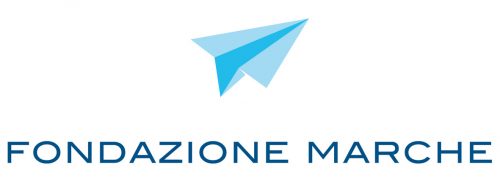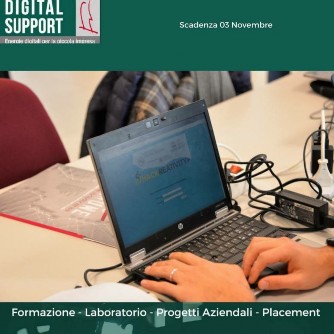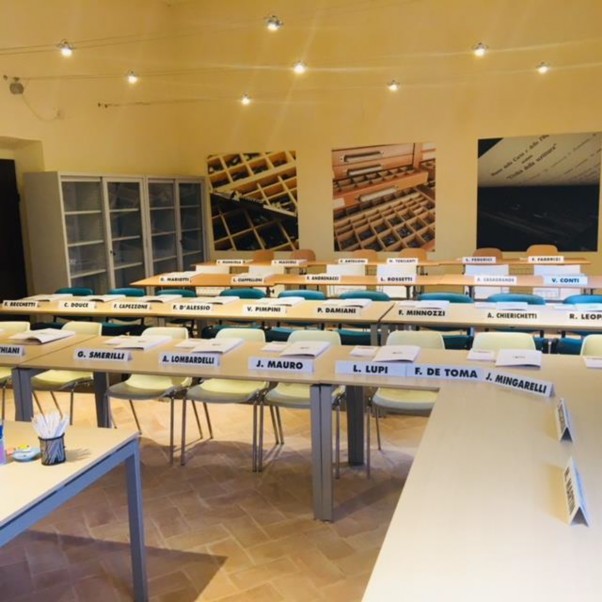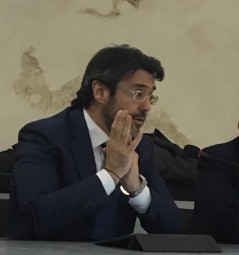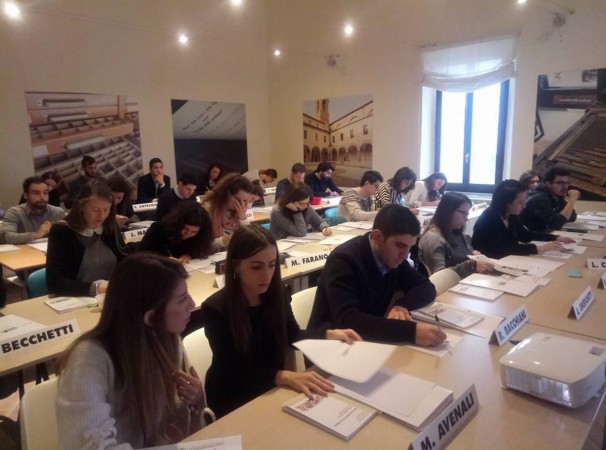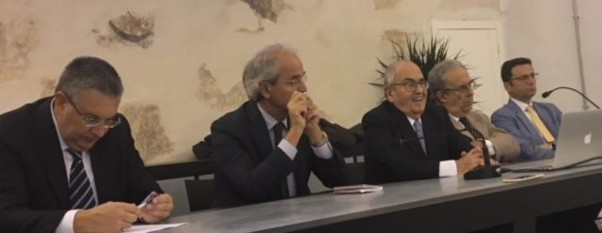Fondazione Aristide Merloni and Fondazione Marche
in collaboration with the Department of Management, Marche Polytechnic University and LUISS Business School
The Fondazione Aristide Merloni and Fondazione Marche, in collaboration with the LUISS Business School and the Department of Management of the Marche Polytechnic University, have launched a web marketing training scheme for highly motivated graduates who wish to extend their knowledge of the digital economy.
DIGITAL SUPPORT is a programme aimed at creating a group of professionals specialised in marketing strategies – particularly in the digital domain – for micro and small enterprises. The Business School was announced by the Chairman of the Fondazione Aristide Merloni, Francesco Merloni, during a meeting of the Scientific Committee of the Fondazione Aristide Merloni in July 2017.
Digital transformation is very important for the Fondazione, which works to support local entrepreneurial activity: in the Marche region in particular, micro and small enterprises play a crucial role in the economic and social development of the local area. The competitiveness of these undertakings, however, depends not only on the way they “do business”, but on their ability to respond to new and sudden changes in a market that is feeling the effects of the oncoming digital economy. The acquisition of knowledge and operational skills in the field of digital marketing could therefore be an important driver for development.
A serious obstacle to be overcome is the availability of resources such as personnel and the know-how needed to foster growth in this area. This is why there is a need for trained professionals who can bridge the gap between enterprises and the new business opportunities provided by the Internet.
The Fondazione’s support for the digital transformation of the Marche territory already includes the launch of an entrepreneurship training programme called “Missione Impresa 2”, which has offered guidance to 35 local entrepreneurs on how to approach the Internet. The Foundation has also tested the potential of Web 4.0, especially thanks to HACKreativity, a Hackathon dedicated to applying Open Data and Big Data to the needs of local manufacturing enterprises.
The starting point of DIGITAL SUPPORT was the “Business Development Lab”, a digital entrepreneurship laboratory. The initiative involved Fondazione Merloni and Fondazione Marche gathering 30 central Italy companies, all affected by the 2016 earthquake, to launch post-revitalisation earthquake projects with the support of digital consultants.
The business fabric’s strong response to this opportunity and the first positive results gained by the participating firms have encouraged the two foundations to conceive a more structural initiative, one that can create an authentic “digital ecosystem” around small and medium-sized enterprises in the Marche.
Digital Support: the birth of an innovative training path that will allow trainees to work directly with companies, under the supervision of a group of coaches/expert tutors, with the aim of devising and implementing ad hoc solutions based on the needs of the individual companies. A highly operative process aimed at creating a group of consultants specialised in marketing strategies – particularly in the digital domain – for micro and small enterprises.
The project
The project was planned for 26 weeks (from 20 November 2017 to 10 June 2018), and was divided into two phases:
First phase (18 weeks)
10 weeks of training & laboratory activity with workshops at the Luiss Business School.
The programme includes two initial modules on Corporate Strategy (Strategy, Organisation, Management Control and Corporate Finance) and Marketing (Strategic Marketing, Operational Marketing and Business Communication). The objective is twofold: on the one hand, to standardise the skills of participants who don’t have an economic background, and on the other, to give the trainee consultants an overall vision of marketing within the pricing and strategic system of an enterprise, therefore providing them with the skills that they need to effectively slot into business processes and to properly evaluate the results of digital communication against the firm’s performance. The modules include the application of marketing strategies in a digital environment, social media marketing, email and mobile marketing, the Google ecosystem, an introduction to website development and e-commerce. The face-to-face lectures will be followed by more practical activities, in which the trainees will work with the enterprises and the tutors to complete digital consulting projects:
- 2 weeks of company check-up with visits to enterprises
- 2 weeks of project development in support of enterprises and tutoring with 5 professionals from the industry
- 2 weeks for project implementation with the enterprises, backed by a 250 euro contribution from Fondazione Marche and matched funding for the same amount from the company.
Second phase (8 weeks)
Placement orientation based on the projects carried out in the previous phase; the projects will be evaluated for the purposes of assigning the trainees to enterprises or to support the establishment of any operating companies.
The innovative format of the lessons prepared by DIGITAL SUPPORT has been endorsed by the Italian Society of Marketing, which has decided to support the initiative. This recognition is only awarded to very few well-established Master’s programmes in Italy.
Recipients and communication
The project has been delivered mainly to triennial and advanced graduates in Economics, Management Engineering/IT/Telecommunications, Communication Sciences, Political Science, Philosophy and Arts from the regions of central Italy. It was decided to accept applications from non-graduates with proven professional experience and suitably high motivation.
The decision to involve multidisciplinary profiles was made, acknowledging the transversal nature of digital skill sets. Having evolved since its origins, web marketing today requires human/creative tools and skills (SEO, copywriting, email marketing), together with more corporate and classic marketing abilities, and also programming and web development skills.
DIGITAL SUPPORT has been sponsored by an advertising campaign covering daily and weekly newspapers (Corriere Adriatico, Resto del Carlino, Corriere dell’Umbria, Corriere di Rieti, Corriere di Viterbo; L’Azione); national newspapers (La Repubblica); online publications (QDM, CentroPagina, Cronache Anconetane, Radio Gold); local radio stations (Radio Subasio, Radio Gold, Radio Arancia, Radio Veronica, Radio Velluto, Radio Conero Break); targeted newsletters (AlmaLaurea database, ALFIA and ALFEA associations of engineering graduates, Contamination Lab UNIVPM, industry associations); contacts with universities and employment centres for distribution by print and email (ISIA Urbino, Academy of Fine Arts of Macerata, UniUrb, UnivPM, UniCam, UniMC); Facebook advertising and social media marketing initiatives (Facebook, Instagram, Twitter). The advertising campaign pointed users to a registration form on the website of the Fondazione Aristide Merloni. 71 applications had been received within the deadline, on 3 November. A shortlisting process of CV selection and assessment interviews narrowed the group down to a class of 31 people, with 22 women and 9 men.
| Giulia Smerilli | San Severino | Master’s degree Communications | 1990 |
| Federica De Toma | Macerata | Master’s degree Economics | 1992 |
| Leonardo Lupi | Teramo | Master’s degree Economics | 1992 |
| Federica D’Alessio | Chieti | Master’s degree Legal Services | 1992 |
| Jessica Mauro | S. Benedetto Tronto | Master’s degree Economics | 1992 |
| Laura Rossetti | San Giorgio di Pesaro | Master’s degree Communications | 1989 |
| Valeria Conti | Fermo | Master’s degree Tourism | 1990 |
| Francesca Minnozzi | Civitanova Marche | Master’s degree Languages | 1992 |
| Renata Leopardi | San Benedetto del Tronto | Master’s degree Communications | 1992 |
| Alice Lombardelli | Macerata | Degree in Economics | 1993 |
| Chiara Mangiola | San Severino | Master’s degree Economics | 1992 |
| Giacomo Mariotti | San Severino | Master’s degree Economics | 1991 |
| Federico Andrenacci | Civitanova | Master’s degree Economics | 1992 |
| Raffaele Bacchiani | Pesaro | Degree in Economics | 1993 |
| Marco Torcianti | Osimo | Degree in Languages | 1991 |
| Maria Farano | Osimo | Master’s degree Communications | 1992 |
| Viviana Pimpini | Falconara Marittima | Master’s degree in Arts | 1992 |
| Martina Avenali | Jesi | Master’s degree in Economics | 1992 |
| Fabio Becchetti | Matelica | Master’s degree in Economics | 1989 |
| Caroline Douce | Jesi | Master’s degree in Languages | 1975 |
| Alessandro Casagrande | Fabriano | Degree in Languages | 1994 |
| Flaminia Fabbrizi | Fabriano | Master’s degree Communications | 1992 |
| Francesco Arteconi | Fabriano | Master’s degree in Economics | 1990 |
| Jessica Mingarelli | Fabriano | Master’s degree Languages | 1992 |
| Isabella Mascoli | Fabriano | Master’s degree Communications | 1986 |
| Silvia Bruzzechesse | Fabriano | Master’s degree Law | 1988 |
| Pamela Damiani | Sassoferrato | Master’s degree in Archaeology | 1982 |
| Luna Ciappelloni | Fabriano | Degree in Languages | 1984 |
| Federica Capezzone | Fabriano | Academy of Dramatic Arts | 1974 |
| Loredana Federici | Fabriano | // | 1985 |
| Matteo Martina | Ancona | Master’s degree Economics | 1991 |
14 degrees in Economics, 6 in Communication and Marketing, 9 in the Humanities, 2 professional experience CVs;
The day of the presentation
The course was officially presented on Monday, 20 November, at the Conference Hall of the San Benedetto complex. The gathering was attended by Chairman Francesco Merloni, Executive Vice Chairman of Fondazione Marche Mario Pesaresi, the Rector of the Marche Polytechnic University Sauro Longhi, the Dean of the LUISS Business School Paolo Boccardelli, the Prorector of the UNIVPM and course lecturer Professor Gian Luca Gregori and the Director of the Department of Management of the UNIVPM Stefano Marasca. Opening the proceedings, Francesco Merloni did not hesitate to express his satisfaction at the launch of a project of such scope, which he described as a great opportunity for enterprises and for all local organisations. He also highlighted the very strong need for digitalisation in order to support small enterprises and allow the region to pick up the pace.
Rector Longhi observed that Industry 4.0 technologies will radically change all aspects of manufacturing, starting from the size of the factory. The digital transformation is a general transformation of society, making business structures less centralised and fostering the sharing and collaborative dimension of work. In this system, people, products and projects move outside space and time.
The theme was also reprised by Professor Boccardelli. Making reference to platform economies like Uber, he underlined that changes in the labour market and in the organisation of work make it ever more necessary to find a balance between academic skills and practical and operational tools, in order to enable both workers and company structures to manage the flexibility introduced by the digital revolution, while enhancing innovation, creativity and critical thinking.
In his conclusions, Professor Gregori sought to emphasise how DIGITAL SUPPORT could have a significant social and economic function in transferring new skills to young university graduates, thus helping SMEs to enter the digital world in an effective way and to identify new trajectories that will also help create employment.
